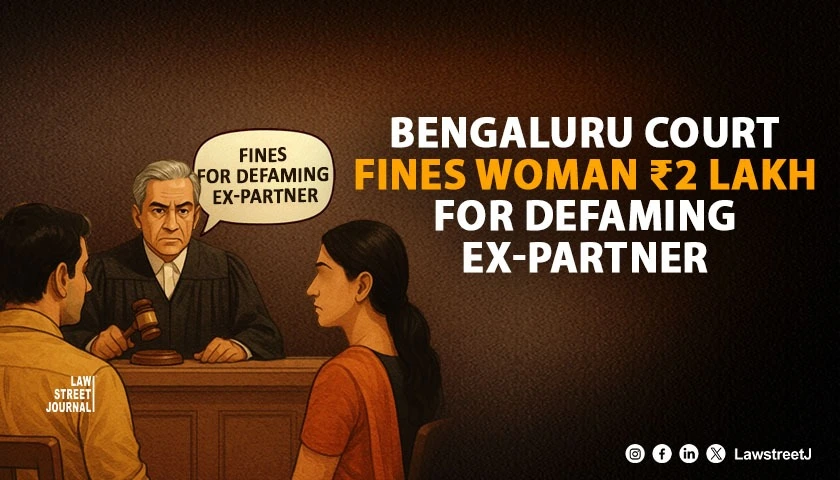Bangalore: A Bengaluru court has granted a permanent injunction restraining a woman from defaming her former partner and from contacting his family members, employer, or peers, after finding that she had sent a series of defamatory and threatening emails following the breakdown of their relationship.
The court also awarded ₹2 lakh in damages to the plaintiff, holding that her conduct amounted to intimidation, harassment, and an attempt to extort money.
The V Additional City Civil and Sessions Judge at Bengaluru, on October 24, 2025, delivered the judgment in a civil suit filed by a 28-year-old IT professional against his former partner. The court observed that the plaintiff had successfully proved, through oral and documentary evidence, that the defendant’s repeated communications contained abusive, defamatory, and threatening content intended to malign his reputation among family, colleagues, and associates.
The plaintiff’s case was that he met the defendant through an online dating platform on November 18, 2019. From December 2019 to June 2021, they were in a live-in relationship for about 17–18 months. The plaintiff alleged that the defendant was a spendthrift with his money, and he made substantial expenditure buying her a laptop, dresses, and other items at her behest.
The plaintiff claimed that after realizing the defendant had no emotional attachment with him and was only centered on finances and materialistic aspects, he decided to peacefully part ways. When he confronted this decision with the defendant, she reacted inappropriately, started abusing him, and threatened dire consequences.
On July 9, 2021, the defendant called the plaintiff to continue the relationship, which he refused. She became infuriated and started raising frivolous allegations. On July 10, 2021, she sent three emails threatening to come to his society with police, file an FIR to prevent him from going to the US, and demanding her belongings.
On July 11, 2021, the defendant sent two more emails abusing and blaming him, threatening to reach out to his mother, and subsequently sent an email to the plaintiff’s mother with a concocted and vulgar version of the relationship, severely defaming him. When the plaintiff’s mother replied on July 12, 2021, that the allegations were false, the defendant sent another email alleging he had sex with her 85 times and demanded ₹30 lakh with mala fide intention to extort money.
The plaintiff alleged that the defendant tried reaching out to his colleagues, seniors at his workplace, college administration, peers, and people at his mother’s workplace to malign his reputation and extort money. On July 19, 2021, she sent emails to his college authorities, reached out to college friends, previous employer, and senior colleagues making defamatory statements. She also called the plaintiff’s mother’s workplace asking for his personal contact number and sent the call recording to intimidate him.
On July 22, 2021, the defendant sent a threatening email stating she would register an FIR for offences punishable under Section 375 IPC, creating extreme pressure to give her ₹30 lakh. The plaintiff claimed he suffered insult, social embarrassment, and mental harassment, fearing the defendant would commit the same acts in future.
After due service of summons, the defendant appeared through her counsel but did not file any written statement. The plaintiff produced his oral evidence as PW1 through an affidavit by way of examination-in-chief reiterating the plaint averments. He produced documentary evidence Ex.P1 to Ex.P9, including email letters (Ex.P1 to Ex.P6), 21 documents containing defamatory statements (Ex.P8), and certificates under Section 65B of the Indian Evidence Act (Ex.P7 and Ex.P9).
The court noted that the plaintiff’s pleadings remained undisputed, and that both the oral and documentary evidence he produced were unchallenged.
The court therefore observed, “On perusal of the above evidence produced by the plaintiff, both oral and documentary, it appears that the defendant sent emails containing threatening content to the plaintiff and also defamatory statements to his mother, his college authorities, colleagues, and employer.”
It also held, “To live a dignified life is the fundamental right of every citizen of this country. A person cannot defame or intimidate another. They are illegal acts. Therefore, the above alleged acts of the defendant are illegal acts.”
Noting that the defamatory acts continued until shortly before the filing of the suit and the plaintiff’s apprehension they would continue in future, the court held the plaintiff was entitled to the reliefs prayed for.
The court decreed the suit with costs, granting a permanent injunction restraining the defendant from committing any acts of defaming the plaintiff in future by making defamatory statements and from contacting any family members, peers, employer, friends, or any person associated with the plaintiff directly or indirectly.
The court directed the defendant, by way of mandatory injunction, to issue a public apology in relation to the defamatory emails sent by her regarding the plaintiff within three months. The defendant was also directed to pay damages of ₹2,00,000 (Rupees Two Lakhs only) to the plaintiff within three months.
Case Title: [Names withheld as per court order]



![Gujarat High Court Dismisses Rahul Gandhi's Plea to Suspend Conviction in Modi Surname Defamation Case [Read Judgment]](/secure/uploads/2023/07/lj_6107_2da9b8d7-b0ad-4f07-9fff-a2ceea4c46cd.jpg)
![Delhi Court Rejects Stay Request in Defamation Case Against Rajasthan CM Ashok Gehlot [Read Order]](/secure/uploads/2023/08/lj_5208_80de1ddc-d76a-4f7f-b180-408e3ae14fb4.jpg)

![Bengaluru Court Orders Twitter (X Corp) to Block 'Liver Doctor' Account Amidst Defamation Lawsuit by Himalaya Wellness Company [Read Order]](/secure/uploads/2023/09/lj_8798_ffedf2a6-87bc-4d90-a3b4-077c76b2dd87.jpg)




